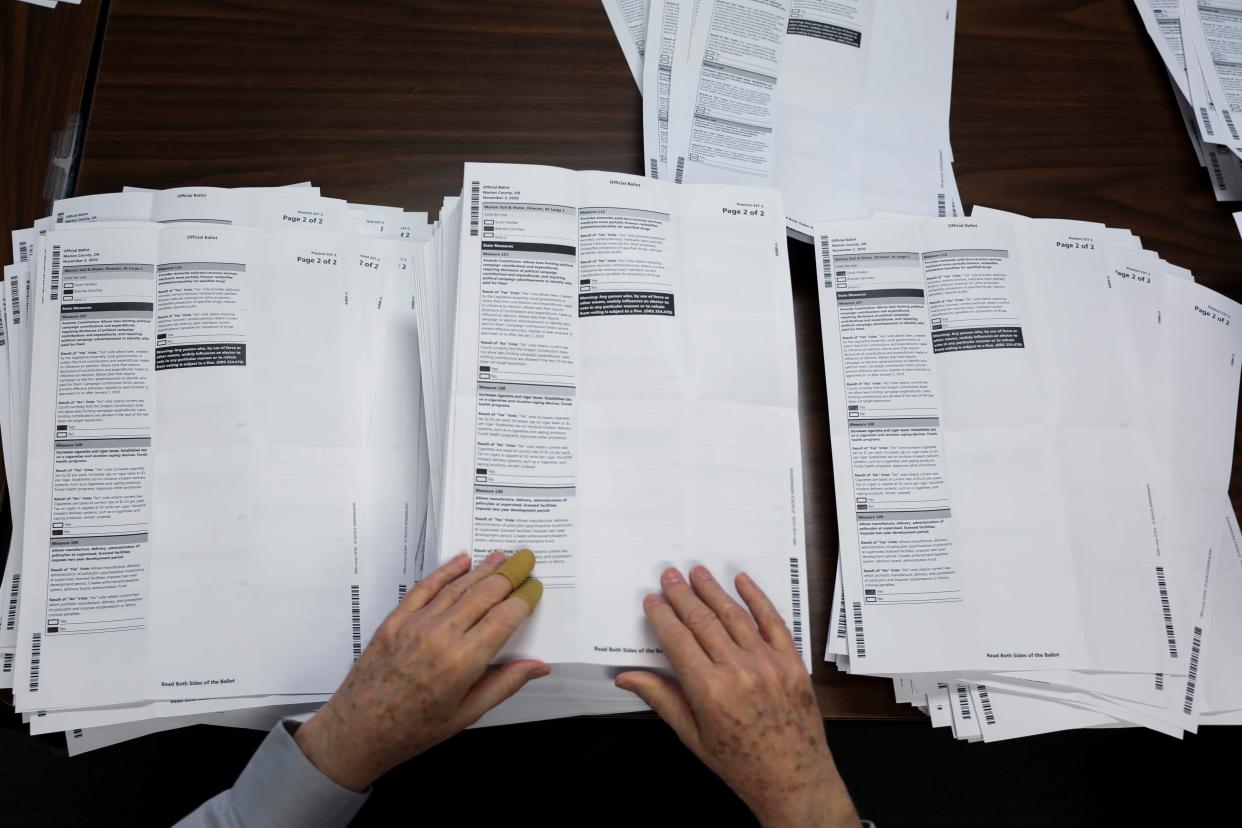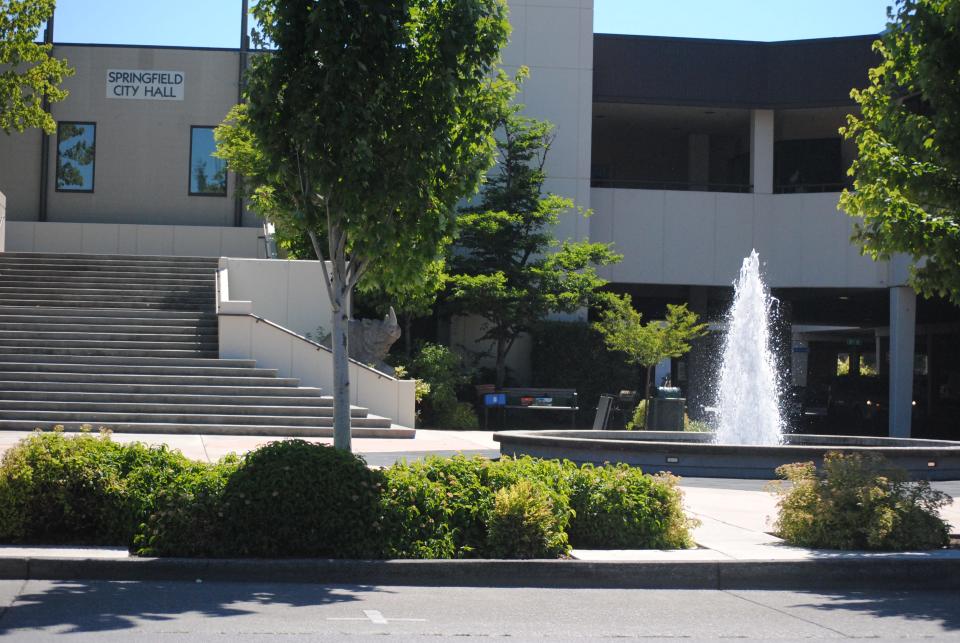Eugene, Springfield and Lane County officials weigh in on Measure 110 reform

Over the past month, elected officials in Eugene, Springfield and Lane County finalized three different documents calling on the Oregon Legislature to reform Ballot Measure 110, the 2020 voter-approved initiative that decriminalized drug use and possession and outlined a new system for addiction treatment in Oregon.
Lane County's resolution was the most detailed of the three and focused primarily on recommendations that would increase resources and give counties more control over addiction treatment. Springfield's focused on a desire to "reintroduce accountability" for drug users.
Eugene councilors avoided going into specifics, instead approving the single sentence, "Eugene supports efforts to reform Ballot Measure 110.”
Lane County's preferred Measure 110 reform: County-led treatment
The county's resolution, which commissioners unanimously approved on Tuesday, focused mostly on ways the county thinks the state can improve access to addiction treatment, with the biggest recommendation focused on changes to give counties more authority.
"Counties need to be the center of the conversation. We've been far from the center of conversation," said county Commissioner Pat Farr.
The Oregon Health Authority administers Measure 110 through 42 local Behavioral Health Resource Networks across the state, most of which are coalitions of social service nonprofits. The BHRNs report to the Measure 110 Oversight and Accountability Council, which is housed under the OHA.
Lane County wants to restructure the BHRNs to the way Gov. Tina Kotek structured the All-In program to address homelessness, where multi-agency groups led by regional governments coordinate state funding, which would give county governments more authority over how Measure 110 money is spent.
"The BHRNs are doing really good and important and valuable work as they exist, it's just an opportunity to improve," said county Commissioner Laurie Trieger. "I just want to make sure we keep lifting up the value of the BHRNs, and it would be a value add to have them integrated with us and sharing data and make everybody's work more efficient."
County commissioners also want to redirect BHRNs priorities. Currently, the state legislature tells BHRNs to provide seven services:
Screening for both immediate medical need and for a "comprehensive behavioral needs assessment," which includes substance abuse disorder
Case management
Ongoing peer counseling
Harm reduction
Low-barrier substance use disorder treatment
Housing for people with substance use disorders
Employment support for people with substance use disorders
In their statement, county commissioners said BHRNs should be redirected to focus most of their attention on substance use treatment. They also said the state Legislature should expand BHRNs' authority to serve people involved in the justice system.
"One of the things we experienced in Lane County was a BHRN that was proposed to treat only criminal justice involved individuals," said Alex Cuyler, Lane County's intergovernmental relations manager. "It did not get funded … because it didn't provide access to all Oregonians. So we really feel like as we move forward here, we do need something that if there is an applicant that's just focusing on that population that it's eligible for funding."
In its other recommendations, the county said Measure 110 reform should:
Recriminalize drug possession and public drug use.
Support jail diversion programs.
Increase resources to specialty courts such as Eugene's community court and Springfield's in-development drug court.
Give county governments a financial incentive for successful county-level programs such as Community Corrections.
Give county public health departments access to the state database tracking drug overdoses.
Permit first responders to take people to drug treatment locations.
Springfield's preferred Measure 110 reform: Authority to recriminalize
On Monday, the Springfield City Council unanimously adopted a less detailed resolution that focused more on a desire to recriminalize drug use. At the top of the page, councilors said the state legislature should "modify Measure 110 to reintroduce accountability for drug offenses."
Springfield councilors said they agreed with a need to increase access to addiction treatment but also argued that the way to ensure people sought treatment was through recriminalization.
"What many of the voters wanted to get to was increased resources for addiction services and getting people into treatment," said Springfield City Councilor Kori Rodley, and recriminalization was how "we get to that intended consequence with what we can control as a city."

Councilors outlined four changes they want the state legislature to make.
Increase the number of treatment programs and sobering facilities.
Increase funding for addiction services for people Springfield Police and Lane County Sheriff's deputies arrest.
Recriminalize public drug use.
Give local governments the power to recriminalize drug use and possession.
Eugene City Council and Measure 110 reform: Flexibility
On Nov. 8, Eugene city councilors unanimously voted to add the single sentence "Eugene supports efforts to reform Ballot Measure 110" to the city's 2024 State and Federal Legislative Policy document that outlines the City Council's position on 95 issues that could be taken up by the state or federal government.
City leadership said this broader statement would give the city's lobbying arm more flexibility to come back to the council for more detailed recommendations after they have a better idea of where discussions among the state Legislature are going.
"The recommendation … is to adopt a statement, pretty broad, that just says the city of Eugene supports reform Measure 110," Ethan Nelson, Eugene's intergovernmental relations director, told councilors at the meeting, a recommendation councilors followed.
Nelson said the broader statement would give him and other staff more flexibility to advocate based on where conversations within the state Legislature go.
"The policy landscape on this topic is currently evolving and changing, as is evident from the presentations and testimony at today’s Joint Committee meeting," Nelson told the Register-Guard. "Within that fluid environment, we are more successful in advancing policy aligned with Council goals when the direction allows for flexibility and negotiation."
Alan Torres covers local government for the Register-Guard. He can be reached over email at atorres@registerguard.com or on twitter @alanfryetorres.
This article originally appeared on Register-Guard: Measure 110 reform: Eugene, Springfield, Lane County weigh in

